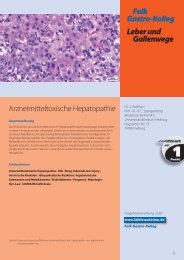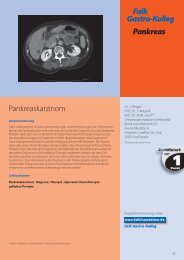152 153 Intestinal Disease Meeting Berlin 2006 - Dr. Falk Pharma ...
152 153 Intestinal Disease Meeting Berlin 2006 - Dr. Falk Pharma ...
152 153 Intestinal Disease Meeting Berlin 2006 - Dr. Falk Pharma ...
You also want an ePaper? Increase the reach of your titles
YUMPU automatically turns print PDFs into web optimized ePapers that Google loves.
J. Schölmerich<br />
Only a minority of patients profits<br />
from the “Top Down” concept<br />
Not in favor of this concept was J. Schölmerich<br />
(Regensburg). In his opinion, the proponents of<br />
the “Top Down” concept overlook the fact that<br />
only a minority of patients do not benefit from<br />
the currently standard “Step Up” paradigm. The<br />
more aggressive “Top Down” approach would<br />
represent an unnecessary risk for these patients<br />
and also burden the medical insurance system<br />
with unjustifiable increased costs. According to<br />
J. Schölmerich, the goal of treatment of IBD consists<br />
of reducing patients’ symptoms, inducing<br />
and maintaining disease remission and thus preventing<br />
renewed acute disease flares and structural<br />
changes. “These objectives,” he said, “are<br />
realized in the majority of patients using the<br />
standard therapy.”<br />
Start with medications of proven<br />
efficacy<br />
The “Step Up” model begins with medications<br />
of proven efficacy, such as mesalazine in ulcerative<br />
colitis and, in Crohn’s disease, of this medication<br />
together with the locally acting steroid<br />
budesonide and, where indicated, antibiotics.<br />
Only when these medications do not prove effective,<br />
said J. Schölmerich, should patients be<br />
started on medications, such as systemic corticosteroids,<br />
azathioprine or even methotrexate,<br />
Congress Short Report <strong>Falk</strong> Symposium<br />
that are stronger but also are associated with<br />
greater risk of side effects. If patients fail to respond<br />
to these medications with remission or if<br />
they relapse the next step can be administration<br />
of the TNF-α inhibitor infliximab or cyclosporine,<br />
which is indicated in ulcerative colitis.<br />
Very few patients require<br />
accelerated therapy<br />
This type of accelerated therapy is required in<br />
only a small percentage of patients, the gastroenterologist<br />
said. A majority of patients, in<br />
fact, can be brought to remission during the first<br />
therapy step and can be maintained free of disease<br />
flares for extended periods. J. Schölmerich<br />
cited data according to which 35% of Crohn’s<br />
patients and 48% of those with ulcerative colitis<br />
remain symptom-free and feel well at four years.<br />
The fact that patients with inflammatory bowel<br />
diseases exhibit a practically normal life expectancy<br />
also confirms the success of the current standard<br />
treatment in the majority of cases.<br />
In addition, J. Schölmerich said, the exact meaning<br />
for an individual patient of endoscopically<br />
documented mucosal healing and whether this<br />
observation is associated with a better long-term<br />
outcome remains completely unclear. “Unlike in<br />
rheumatology, where joint destruction can be<br />
directly visualized, there are no corresponding<br />
endpoints in inflammatory bowel diseases,”<br />
J. Schölmerich said. At present, mucosal healing<br />
can be considered a surrogate parameter, the<br />
long-term meaning of which in achieving a favorable<br />
disease course remains unclear. According<br />
to J. Schölmerich, the current situation does<br />
not justify treating patients with newly diagnosed<br />
Crohn’s disease or ulcerative colitis according to<br />
the “Top Down” model. This would, in his opinion,<br />
represent “overtreatment”.<br />
<strong>153</strong><br />
39

















